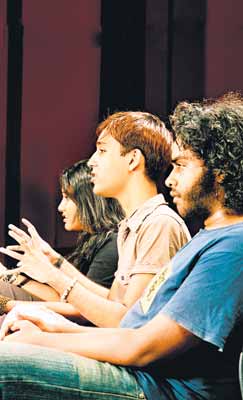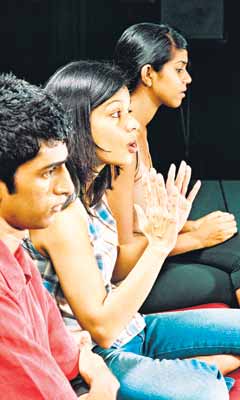
| Provocative chats up the many shades of the teen spirit in Chatroom The six chairs placed in a row at the front of the stage are currently occupied. From their positions, the six teenagers slouch, sneer, smile prettily or hesitantly; they reach for attention, they use words like knives and little nicks draw blood; packets of chips are broken open, cups are emptied while alliances are formed and broken… the 'weak' don't stand a chance.
Through it all, they never, ever, look at each other… instead they speak to us. You and I are the audience, sitting silently in the darkness; we are the witnesses to what transpires in the Chatroom. The Mind Adventures Theatre Company's production of Chatroom stars Arun Welandawe-Prematilleke as William, Brandon Ingram as Jim, Tehani Chitty as Laura, Erasha Sugathapala as Eva, Ruvin de Silva as Jack and Subha Wijesiriwardene as Emily. The play follows the events that occur in a chatroom christened 'Cork's Bloody Opinionated.' Here five teenagers (minus Laura) gather in what is quickly established as a safe and neutral space; no-one knows each other, no-one uses their real name. It is enough that they are from the same city and are around the same age. Each character immerses themselves in the unpredictable, seemingly uncontrolled world of the internet, forging intimate relationships from the anonymous safety of their own homes. There is practically no physical movement in the play, considering that all the action takes place with the characters glued to their computers. This isolation serves somehow to underline the very real distances between the characters themselves. It also marks out what should be, but is not, a comfortable buffer zone between them. In this play, words are everything – they are your only weapons, your only defence. They are only as true as you want them to be. At its heart, Chatroom is a drama of personalities – what drives them, how they act and react, how they evolve. William, Eva, Jack, Emily, Jim and Laura are pretty much your everyday teenagers and are, initially at least, easy to dismiss as such. When William laments the passivity of modern teenagers, stating that "we're all clichés," you know it's true of William himself. Sure William is pretentious, controlling, and is obviously trying a little too hard. But give him time, and you'll find that there's something a little unnerving about William, some part that revels in cruelty, that's just a little bit dark.
This is a guy you don't want to be vulnerable to. In William, Arun easily has one of the most powerful characters in the play and makes the most of it. In his hands, William is smart, funny, and sinister. He is somehow the source of the tension that laces the final scenes of the play, and obviously revels in it. Now Jack is a different proposition all together. Jack is a straightforward guy and doesn't really have patience with the mind games William delights in. Jack still enjoys orange oompa loompas and doesn't mind admitting it – obviously he's a lot more comfortable with himself than any of the others. He is also interesting, because in the everything-you've-been-brought-up-to-believe-is-a-lie-world that William advocates, Jack maintains pretty clear ideas of right and wrong. Despite this Jack isn't a match for William. Jack simply isn't cold blooded or vicious enough. And when it's William, you had better be prepared to shout louder, hit harder and be meaner if you want to win. Ruvin is entirely believable as this play's nice guy and is easily one of the most likable characters. The relationship between William and Jack is reflected in that between Eva and Emily. But where William has pretensions to intellectualism, Eva is more directly malicious. Eva is the kind who will shred you to bits with a few well chosen sentences, reduce you to tears and then sit back to enjoy the show. Erasha fits the character perfectly. There's a certain contemptuous cum sinister look she has down to pat, a look that assures you that for this girl you're only as good as the entertainment you provide. Subha who plays Emily, on the other hand, is perhaps the only genuinely sweet character in the play. She and Jack share a certain simplicity, though Emily is admittedly the more naïve of the two. Laura is initially the most inscrutable of all the characters. Her hang out is the Teenage Suicide Chatroom, where she acts as a young counsellor, listening to troubled teenagers like Jim. As he vomits out all the dreary, depressing details of his life – his troubled relationship with his family and his own lack of self respect – Laura simply listens. "The rule in the room is we don't give advice," is Laura’s anthem, and as you watch her, you can't help but ask yourself, 'what could she possibly get from this?' The truth is no one is quite sure, least of all Laura herself. Tehani chooses to play Laura as mature, reserved and surprisingly gutsy. For all her silence, this is a girl you want on your side of the fence. If Brandon is the catalyst, Tehani is their hope. She is at the very heart of the play, especially in a speech she gives near the play's climax, and as such is crucial to the choices Brandon's character ends up having to make. Brandon plays Jim. When Jim and his somewhat pathetic existence come to the attention of William and the others, he is adopted as their 'cause.' Jim – depressed and considering suicide - acts as a sort of catalyst, forcing the other characters to become what they always had the potential to be – malevolent or courageous, take your pick. Brandon makes for an entirely believable Jim. Vulnerable, effeminate, even gullible but with a nearly invisible core of strength, Brandon's emotionally charged and moving portrayal of Jim is definitely one of the highlights of the performance. "Especially when you're a teenager, it feels like adults don't understand you, that you're being ignored, that they don't take you seriously… that you're just another nameless, faceless blob that has been brought up to fit into these little keyholes and that if you don't fit in then there's something very odd about you and wrong," Tracy said earlier when speaking about Chatroom. And that's precisely it, right there is the biggest draw of the play. Chatroom seems to understand teenagers at a basic level – their frustrations, their fears, their longing for acceptance and control. It doesn't preach, but it does address crucial, even frightening issues. As a playwright, Enda Walsh lets you in on where everyone is coming from… you can even sympathise with Williams' longing for purpose. Walsh provides the context, lets you follow through with the unravelling of the plot, brings you to the sticking point, and then offers you an alternate solution. In the end, through confrontation, honesty, and simple choice, Walsh's characters are allowed to find their own redemption. That he manages all this in a play that only lasts an hour is quite an achievement. A 60-minute masterpiece, Chatroom is short, sharp and provocative – a play that through its direct honesty brings to intense, vivid life the possibilities and pressures young people on the verge of adulthood face in the 21st century. Chatroom is directed by Tracy Holsinger and is a production of the Mind Adventures Theatre Company. The play will be staged at the British School Auditorium on February 23, 24 and 25 from 8 p.m. onwards. Tickets are available at the Wendy Whatmore Academy on 13th Lane. Media sponsors for the event are Yes FM, Channel 1 MTV, The Sunday Times and The Daily Mirror. |
|| Front
Page | News | Editorial | Columns | Sports | Plus | Financial
Times | International | Mirror | TV
Times | Funday
Times | MediScene || |
| |
Copyright
2007 Wijeya
Newspapers Ltd.Colombo. Sri Lanka. |

